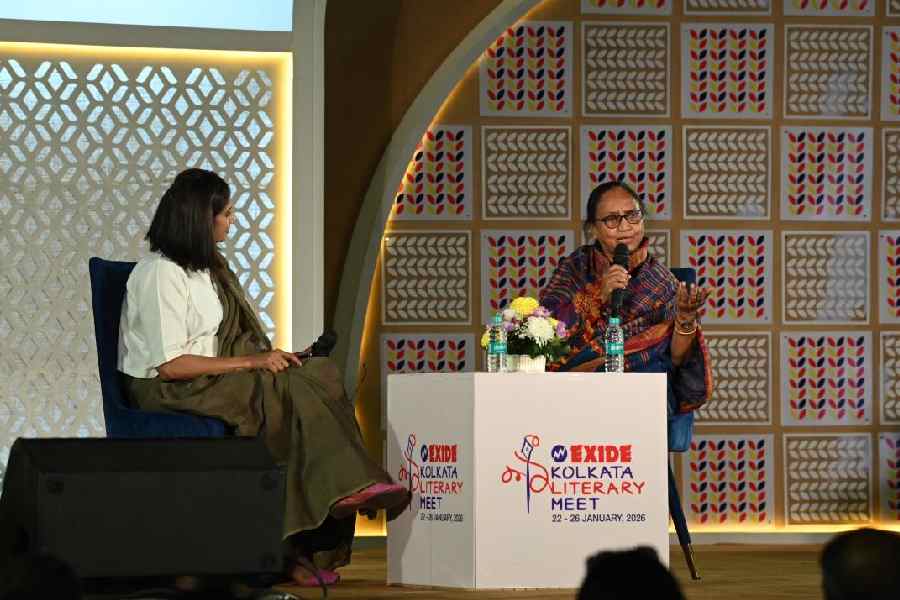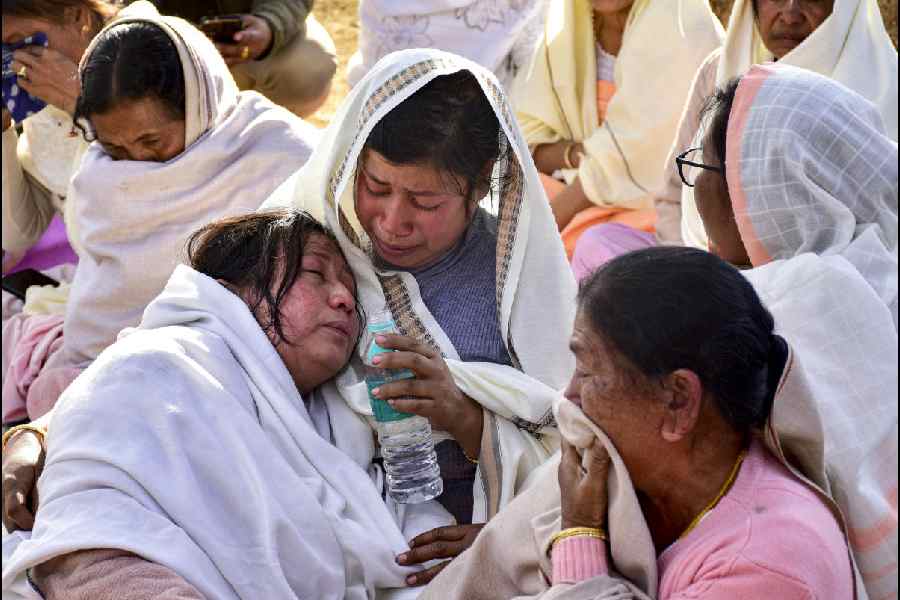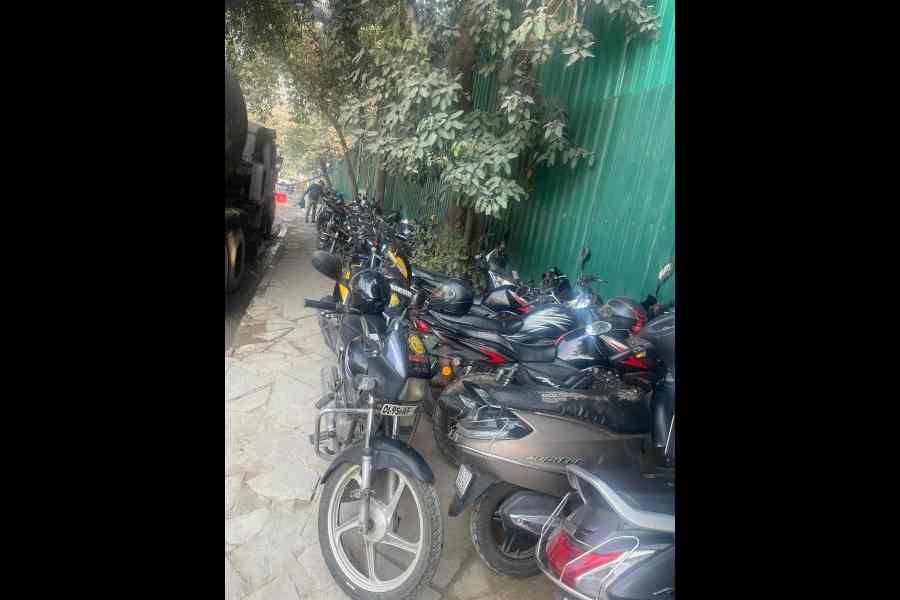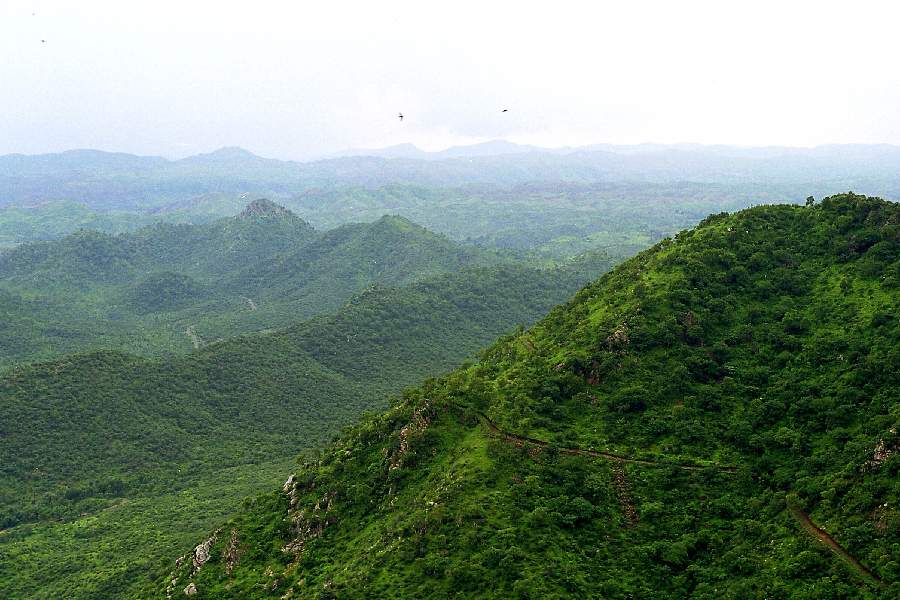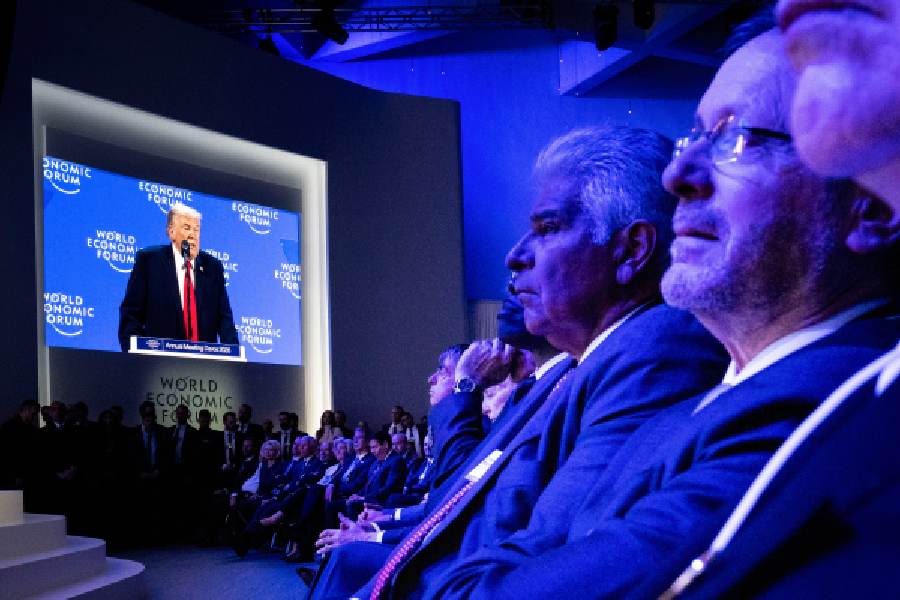.jpg)
The images blur and merge. The octogenarian with the familiar smile is now a baby in his mother's arms. Then he is a young man with haunting eyes and unkempt hair. And here he is once again, the man with that gently lined face and smile.
Soumitra Chatterjee is not just the man in front of you, sitting in his Calcutta residence in a kurta and pyjamas, stooping just a bit, and warning you that he can't hear all that well anymore. He is the young man of cinema who lost his child bride, the playful brother-in-law who broke a heart, the dashing detective, the revolutionary and the husband who wants a divorce after 50 years of marriage.
Right now, though, he is a toddler, being put to bed by his mother.
"My mother couldn't sing, so she used to recite poetry. She would read out Tagore's poems for the young to us. And we grew up listening to poetry," Chatterjee recalls.
The actor grew up in Krishnanagar, about a hundred kilometres from Calcutta. That was D.L. Ray country, he reminds you, and theatre was in every home. His father and grandfather were ardent elocutionists and theatre lovers. On weekends, there were poetry reading sessions at home, and the children joined in.
"I was in love with literature from my childhood. But I think acting happened even before that. I remember doing Rabindranath's Mukut. A taktaposh was the stage and my mother's saris were the wings. We - the siblings and neighbourhood children - were the actors; the family and the help were the audience."
Earlier still, he remembers acting in a school play called The Sleeping Princess. And what was his role, you ask. "Naturally, the prince," he says, and laughs. "I often had the main role. I'd developed this bad habit of winning medals," he laughs again.
The 2012 Dadasaheb Phalke Award winner jokingly pats himself on the back - and then gets embarrassed when you ask him if he is the last of the Renaissance men of Bengal - those stalwarts who wrote and painted, penned songs and sang, directed films and acted in plays and cinema.
"I don't think I am one of them - I just have an interest in many subjects. Among Bengalis, among men of that magnitude, there is Amartya Sen. He is a man of international stature, with great insight into so many subjects. He is the last Boro Bangali," he says.
But Chatterjee himself is more than an actor. He is passionate about theatre. He pens poetry and prose and co-edited a much admired magazine called Ekshan. A collection of his non-fiction writing was released last month and the second volume of his plays is expected to be launched soon.
"In 30 years, I have written 29 plays, mostly adaptations," he adds.
He writes poetry, and still carries a notebook to jot everything down that strikes him - from the nascent lines of a poem to the day's budget.
"Even after all these years, I don't know when the next poem will come, or if it will come at all. A poem sometimes hums within you, keeps you up at night, but just doesn't emerge. Then it suddenly strikes you in the midst of a very busy schedule," he says.
He paints, too. Like Tagore, he says, looking a bit abashed as he makes the comparison, his art work began with doodles. Now he does mostly water colours, occasionally acrylic. He held an exhibition in Baroda last year and one in Calcutta in 2013.
It's a parallel that can't but be drawn. Chatterjee - made famous by the director, Satyajit Ray, who cast him in 14 of his films - is in many ways like his mentor who directed classics, sketched, wrote short stories, detective novels and screenplays and composed music. Fourteen years older than the actor, Ray mentored him - "A new Billy Wilder film is being screened - aapni dekhechhen (have you seen it)," he'd ask the younger man. Ray addressed him as "aapni" initially, but later changed it to the more familiar " tumi".
How did they first meet?
Chatterjee is expecting this. He has answered it many times, but it is always worth a recount.
The images blur again. Now he is the young man, doing his Masters from Calcutta University, and working as an announcer in All India Radio. Theatre is his first love and he is a bit snooty - " naak unchu" as he puts it - about Indian cinema.
And then, Pather Panchali happened.
"We were awestruck. We never thought that there could be a film like this," he reminisces.
One day, a classmate accosted him on the street. "He engaged me in conversation. And I saw him gesture to someone on the pavement. Who is that, I asked." That was Satyajit Ray's assistant, checking Chatterjee out for Ray's next venture, Aparajito.
Chatterjee was asked to meet Ray, which he did. "He looked at me and the first thing he said was, ' Aarey, aapni je boro lomba hoye gelen, beshi boro hoye gelen' (But you have turned out to be too tall, too big). I was bowled over by that: the man is so immersed in his work that he doesn't do ' Ashun boshun' - come, take a seat - but jumps straight into the subject," he says.
After Aparajito won the Golden Lion in Venice, Ray told the media that he was going to make the third part of what was going to be called the Apu trilogy. "I got to know much later that he had more or less decided that he would make Apur Sansar when he saw me, because he thought he had found the adult Apu."
Ray, he holds, opened the window to his world. "He was my mentor, all right. More important, he was my inspiration."
Some of the interests that capture Chatterjee today, at the age of 81, were nurtured by Ray. The director encouraged him to recite poetry, and honed his interest in Western classical music.
And now you can picture Chatterjee as a young man, excited about cinema and being feted in cinema-loving worlds as Apu. It is around then that he meets a gentleman, a BDO near Burdwan, and discovers a new love: Western classical music.
"I remember his name, because it was Jyoti Basu," he laughs. "I was with him for a few days. He had a room full of records, and all day long we used to listen to music. So when I returned to Calcutta, I told Manik da that I want to hear more."
When they next met, Ray gave him two foolscap sheets of paper, with handwritten instructions listing all the Western classical music that he wanted Chatterjee to listen to.
Ray also presented him with a violin that had belonged to his grandfather - the writer-technologist Upendrakishore Ray Chowdhury. "He knew my son was learning to play the violin. He said to me, you don't get good violins here, and gave us his grandfather's violin. We repaired it. A few years later, after my son had won some medals, he wanted to hear him - and he was very happy. The violin is still there."
Chatterjee (whose wife, Deepa, played badminton for Bengal) has passed on his creative legacy to his son, Sougata, and theatre director daughter, Paulomi Bose. Chatterjee is working with Bose on an Ibsen play. On the cards is Phera, an adaptation of Freidrich Durrenmatt's The Visit, which stars his grandson Ronodeep Bose. "He has something in him," says the proud grandfather.
Many of the roles that Chatterjee enacted on the stage are now being played by Ronodeep. But the one role that remains Chatterjee's is that of Raja Lear. The play, mounted when the Left Front government was in power, was called off in 2012, despite running to packed halls.
Has he faced trouble, then, because of his perceived proximity to the Left?
"I was Left-leaning even in college, but realised then that I could not be a political activist. But you can still call me a bit of a Marxist," he says.
He has had differences with Bengal's Left leaders. But while he disagreed with them on issues such as Nandigram - the March 2007 police firing on peasants - he wasn't among the artistes who jumped on to the Trinamul bandwagon when it came to power in 2011.
"I suppose I am identified as someone close to the last government. So they tend not to call me to functions. But the chief minister very generously sends me birthday greetings every year," he smiles.
Chatterjee doesn't seem to mind that he is not a part of the gravy train. He is busy with work, but manages to find time for the occasional Hindi film - he liked Kahani, The Lunchbox and Ship of Theseus, and admires Nawazuddin Siddiqui. He is working in Shiboprosad Mukherjee and Nandini Roy's new film, shooting for which is expected to start in November.
"But sometimes I feel, am I being used to the extent that I can be used? Perhaps not," he says.
The thought struck him when he saw the Oscar-winning French film Amour, about an elderly couple whose lives come apart when the wife suffers a stroke. "I think, if they do something like this here, I could do it."
There is a lot left for him to do, you tell him. " Jaani naa - I don't know," he says. "Jotodin deho mon korte debe, kore jabo (I will carry on till the body and the spirit allow me to)."
The toddler's gone. The octogenarian smiles his gentle smile again.
tetevitae
1935: Chatterjee is born in Krishnanagar in Nadia district. Later, his family moves to Calcutta where he completes his BA and MA (in Bengali literature) from City College and Calcutta University
During his student days he comes in contact with theatre legend Sisir Bhaduri. The association nurtures his latent love for acting
1959: Debuts with Satyajit Ray’s Apur Sansar. At the time he is working with AIR as announcer
Ray was casting for Aparajito when he met Chatterjee. But he found the 20-year-old too old to play the teenage Apu. Ray later said that he decided to make Apur Sansar when he saw
Chatterjee, because he saw in him the adult Apu
Thereafter, he worked in Tapan Sinha’s Jhinder Bandi (1961),
Mrinal Sen’s Akash Kusum (1965) and Teen Bhubaner Pare (1969), and many more films
1978: Returns to the stage. Recitation, writing poetry continue on the side
1991: His first National Film Award; it took a long time coming. The French government honoured him with the Officier des Arts et Metiers. In 2004 came the Padma Bhushan and in 2012 the Dadasaheb Phalke Award

.jpg)
